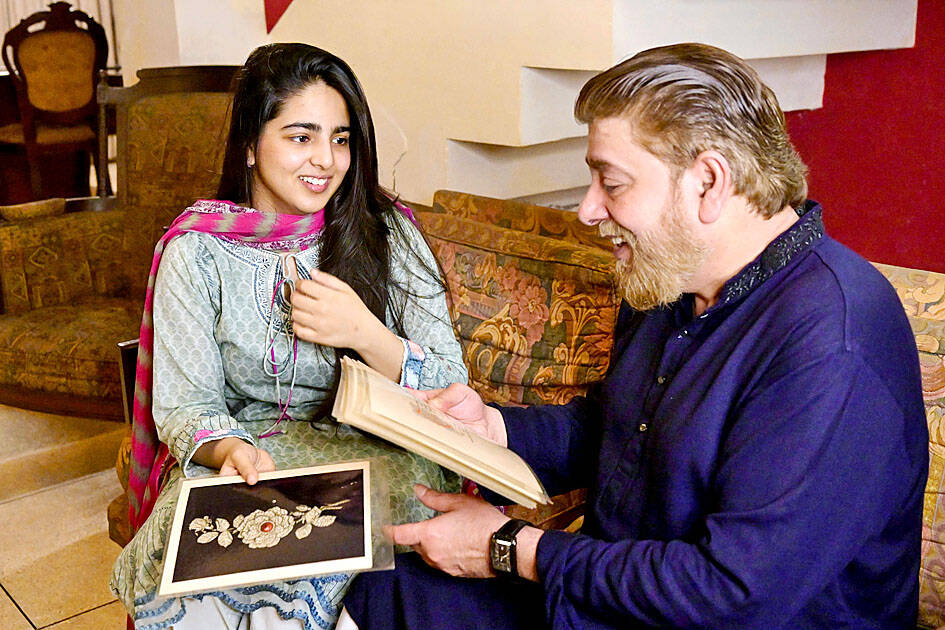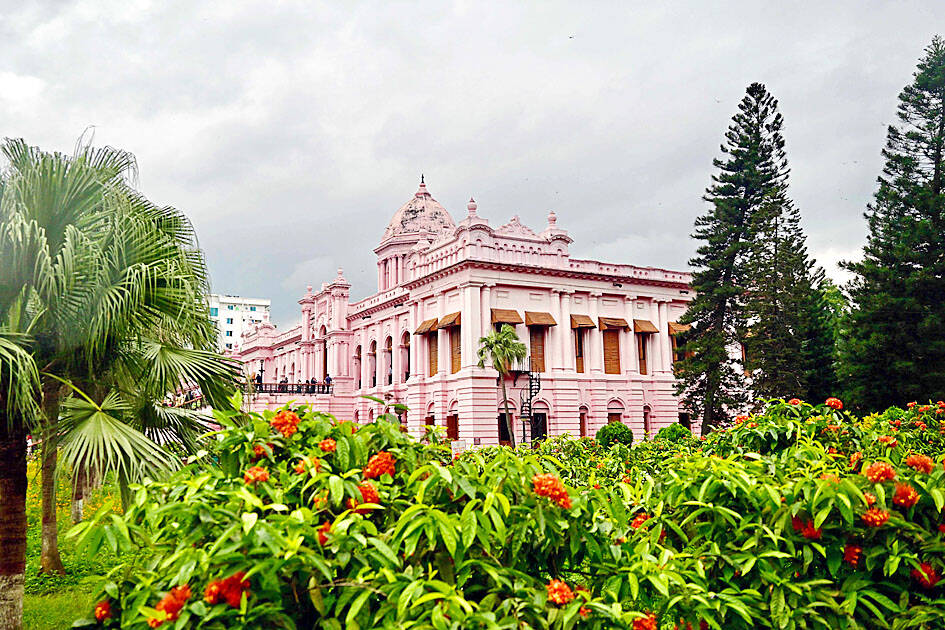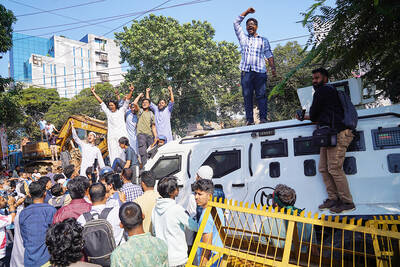For more than a century, the fate of the dazzling Darya-e-Noor diamond has been sealed inside a bank vault — a mystery that haunts Khawaja Naim Murad, great-grandson of the last prince, or nawab, of Dhaka.
Locked away in 1908, were the family’s heirlooms lost during the violence at the end of British rule in 1947?
Did they survive Bangladesh’s war of independence in 1971 and the string of coups that followed, or are they still safe, dusty, but untouched?

Photo: AFP
Many suspect that the jewels are long gone and officials at the state-run bank hesitate to simply open the vault, fearing that they would carry the cost if it is empty.
However, the cash-strapped South Asian government has ordered a committee to unseal the vault — and Murad clings to hope.
“This is not a fairy tale,” said Murad, 55, recounting a story passed down from his father about the giant diamond dubbed the “River of Light,” the centerpiece rock of a glittering armband.

Photo: AFP
“The diamond was rectangular in shape and surrounded by more than half a dozen smaller diamonds,” Murad told reporters.
It was part of a trove of 108 treasures. According to original court documents, they include a gold-and-silver sword encrusted with diamonds, a bejeweled fez with cascading pearls and a fabulous star brooch once owned by a French empress.
The nawab’s riverside pink palace of Ahsan Manzil is now a government museum.
Murad, a former film star, lives in a sprawling villa in a wealthy Dhaka suburb.
He flourished a sheaf of documents, including a family book with detailed paintings of the treasures.
“It is one of the most famous diamonds in the world and its history is closely associated with that of the Koh-i-Noor,” the book says, referring to the shining centerpiece of Britain’s crown jewels — a gem also claimed by Afghanistan, India, Iran and Pakistan. “It is absolutely perfect in luster.”
Another diamond of the same name, the pink-hued Daria-i-Noor, is in Tehran as part of the former royal jewels of Iran.
Murad says that the family’s diamond, too, was once owned by Persia’s shahs, then worn by Sikh warrior-leader Ranjit Singh in 19th-century Punjab. It was later seized by the British and eventually acquired by his ancestors.
However, fortunes shifted. In 1908, the then-nawab, Salimullah Bahadur, faced financial trouble.
Bahadur borrowed from British colonial powers — mortgaging his vast Dhaka estates and placing the treasures in a vault as collateral.
That was their last confirmed sighting. Since then, myth and history merge.
Murad believes his uncle saw the jewels in the bank in the 1980s, but bank officials say they do not know if the vault has ever been opened.
Chairman of the Bangladesh’s Land Reforms Board, A.J.M. Salahuddin Nagri, said that the government body inherited custody of the trove, held in a state-owned bank.
“But I haven’t seen any of the jewels yet,” Nagri told reporters.
The 1908 court papers did not specify the diamond’s carat weight, but valued it at 500,000 rupees — part of a hoard worth 1.8 million rupees. By today’s conversion, that equals about US$13 million, although experts say the market value of such rare and large jewels has since sometimes soared many times higher.
Today’s guardian, Shawkat Ali Khan, managing director of Sonali Bank, said that the safe remains shut.
“The vault is sealed,” Khan said. “Many years back, an inspection team came to check on the jewels, but they never really opened it — they just opened the gate that held the vault.”
He is keen for the vault to be opened at last, although no date yet has been given.
“I am excited,” he said with a brief smile.
The family hopes to discover if any of the century-old debt remains and whether they could reclaim the jewels.
Murad dreams of diamonds, but says his real wish is to simply see the treasure for himself.
“We believe that if anyone dies in debt, his soul never finds peace,” he said.

DISASTER: The Bangladesh Meteorological Department recorded a magnitude 5.7 and tremors reached as far as Kolkata, India, more than 300km away from the epicenter A powerful earthquake struck Bangladesh yesterday outside the crowded capital, Dhaka, killing at least five people and injuring about a hundred, the government said. The magnitude 5.5 quake struck at 10:38am near Narsingdi, Bangladesh, about 33km from Dhaka, the US Geological Survey (USGS) said. The earthquake sparked fear and chaos with many in the Muslim-majority nation of 170 million people at home on their day off. AFP reporters in Dhaka said they saw people weeping in the streets while others appeared shocked. Bangladesh Interim Leader Muhammad Yunus expressed his “deep shock and sorrow over the news of casualties in various districts.” At least five people,

The latest batch from convicted sex offender Jeffrey Epstein’s e-mails illustrates the extraordinary scope of his contacts with powerful people, ranging from a top Trump adviser to Britain’s ex-prince Andrew. The US House of Representatives is expected to vote this week on trying to force release of evidence gathered on Epstein by law enforcement over the years — including the identities of the men suspected of participating in his alleged sex trafficking ring. However, a slew of e-mails released this week have already opened new windows to the extent of Epstein’s network. These include multiple references to US President Donald

LEFT AND RIGHT: Battling anti-incumbent, anticommunist sentiment, Jeanette Jara had a precarious lead over far-right Jose Antonio Kast as they look to the Dec. 14 run Leftist candidate Jeannette Jara and far-right leader Jose Antonio Kast are to go head-to-head in Chile’s presidential runoff after topping Sunday’s first round of voting in an election dominated by fears of violent crime. With 99 percent of the results counted, Jara, a 51-year-old communist running on behalf of an eight-party coalition, won 26.85 percent, compared with 23.93 percent for Kast, the Servel electoral service said. The election was dominated by deep concern over a surge in murders, kidnappings and extortion widely blamed on foreign crime gangs. Kast, 59, has vowed to build walls, fences and trenches along Chile’s border with Bolivia to

DEATH SENTENCE: The ousted leader said she was willing to attend a fresh trial outside Bangladesh where the ruling would not be a ‘foregone conclusion’ Bangladesh’s fugitive former prime minister Sheikh Hasina yesterday called the guilty verdict and death sentence in her crimes against humanity trial “biased and politically motivated.” Hasina, 78, defied court orders that she return from India to attend her trial about whether she ordered a deadly crackdown against the student-led uprising that ousted her. She was found guilty and sentenced to death earlier yesterday. “The verdicts announced against me have been made by a rigged tribunal established and presided over by an unelected government with no democratic mandate,” Hasina said in a statement issued from hiding in India. “They are biased and politically motivated,” she